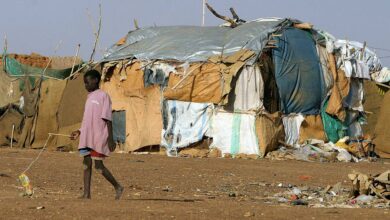Javier’s odyssey to escape Russian bombardment and get to Mexico

By Guadalupe Peñuelas
Ciudad Juarez, Mexico, Mar 15 (EFE).- After an odyssey of thousands of miles through several countries, Mexican musician Javier Don Lucas Pelayo managed to escape the Russian bombardment in Ukraine and return to his hometown of Ciudad Juarez with his wife and son.
Javier, 33, told EFE about his trek at the US border, saying that he, his wife Lesia and their 3-year-old son Olexander were able to escape after enduring almost two weeks of the war in Ukraine, joining the more than 2.8 million refugees who have fled their homeland due to the brutal conflict, according to the figures updated daily by the UN Refugee Agency (UNHCR).
Born in Ciudad Juarez and holding a degree in music, Javier moved to Europe a number of years ago to pursue work opportunities and his studies.
He met his wife, a ballerina in Ukraine, in Poland and the couple moved to Ukraine five years ago, where he worked as a teacher and director of a music academy.
When Russia invaded Ukraine on Feb. 24, the family was in Kyiv to get their son’s documentation in order to that they could leave the country.
From the Ukrainian capital, they began their journey to get out of a country that was – and still is – becoming more and more dangerous and with fewer and fewer safe exit routes, supported initially by Thomas, another Mexican-born Kyiv resident who took them in on the first leg of their trek.
During those first few hours, they sheltered in a bunker, several meters underground, to escape the Russian missile and artillery bombardment, as they sought ways to leave the city.
Finally, they managed to get out by train.
“After that, it was a long odyssey to get to the train with my family. In the station, there were more than 2,000 people looking for a place (on the train). On the Thursday that we caught the train, at 6 in the morning, I began to send audios to the Mexican Embassy so that they could see the situation we were experiencing,” Javier told EFE on Tuesday.
The musician, with his nerves still on edge, recalled that on the train jammed with other refugees he lost track of his wife, although finally they managed to find each other again and the three of them remained together after that.
“When the train was going, many people couldn’t stop crying because they were losing their loved ones,” Javier said, going on to ask international institutions to support the civilian population, especially the children, amid the crisis.
After long hours on board the train, they arrived in the western Ukrainian city of Lviv, near the border with Romania, and from there the refugees made the next leg of their journey on buses or other ground transport until they got to Bucharest, the Romanian capital.
On March 4, a Mexican air force jet carrying 81 refugees arrived in the Mexican capital, most of them Mexicans who had been living in Ukraine.
On board this first plane – and a second Mexican air force jet is in Eastern Europe to bring out a second group of people – were a total of 44 Mexicans, 28 Ukrainians, seven Ecuadorians, a Peruvian, an Australian and a dog.
Javier and his family are safe now, but he said he regrets having to leave behind a large portion of his life, a decision that he made “calmly” but with great sadness.
They arrived in Ciudad Juarez with almost nothing except the clothes on their backs, without his musical instruments, their other belongings and even without their pets.
“There came a point where the money wasn’t important. There wasn’t any (bank where we could) take out money. But the prayers of people helped,” he said, adding that his “greatest wish” is for the war to end.
“Let us think about how much human life is worth,” he said.
Although his case is different, being about a Mexican who returned to his native land, since the beginning of March on the country’s northern border the first arrivals of dozens of Russians and Ukrainians who escaped the war have begun, and, like so many thousands of other migrants, they are seeking to get into the United States to begin new lives.





